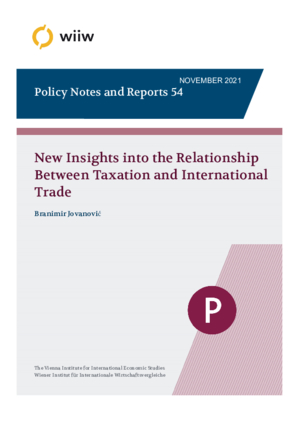New Insights into the Relationship Between Taxation and International Trade
wiiw Policy Note/Policy Report No. 54, November 2021
21 pages including 4 Tables and 5 Figures
This policy note summarises the main findings of our recent research on the effects of labour and corporate taxation on international trade, and discusses their policy implications. The first major finding is that labour taxes do not seem to affect imports, while their effect on exports is likely to depend on how much domestic labour contributes to total value added. If the contribution of domestic labour is low, as has often been the case recently, changes in labour taxes are unlikely to have a major impact on exports. This is an important finding, because it challenges the established view in the literature and policy making, that by lowering labour taxes, authorities can improve the trade balance. The second major finding is that the effect of corporate tax on exports and imports depends on the stock of FDI. Corporate taxes are unlikely to affect international trade in general, but only when the stock of FDI is large. This means that corporate taxes affect international trade through multinational enterprises, which reduce their activity in countries with higher taxes and increase it in countries with lower taxes. Both labour and corporate taxes have seen a downward trend in recent decades, but we find that the contribution of this to the expansion of international trade has been small.
Reference to wiiw databases: wiiw Annual Database
Keywords: abour taxes, corporate taxes, international trade, exports, imports
JEL classification: F14, F16, F23, H24, H25, J32
Countries covered: EU, OECD
Research Areas: Macroeconomic Analysis and Policy, International Trade, Competitiveness and FDI, Sectoral studies
